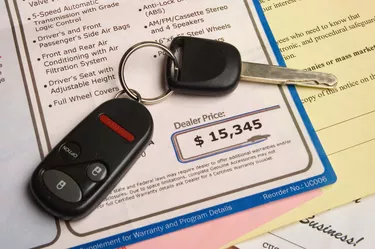
You may want to get out of an auto loan because the car is defective, or you're the victim of a predatory loan scheme. If so, you have the right to return the car and cancel the loan. Sometimes, however, the car and the loan terms are as promised, but your financial circumstances no longer support the car payments. When that happens, act quickly to reach an agreement with the lender that salvages your credit.
Rights of Recission
Video of the Day
Under federal law, consumers have a right to rescind certain kinds of loans within a 72 hour period following the contract signing, notably mortgage loans. Under federal law, however, there is no right of rescission on car loans. Nor do state laws give you that right.
Video of the Day
Hidden Defects
If your new car is defective, that's another matter. You're covered under the federal lemon law, the Magnuson-Moss Warranty Act, which gives you the right to the return of your down payment and all subsequent loan payments when the car has serious problems.
Many states have their own lemon laws, some more stringent than federal law. California's lemon law, for example, includes similar consumer rights for some buyers of used vehicles. If you bought your defective used car from a California dealer and it included a written warranty, you may be able to return the vehicle and get your money back.
The uncertainty over this right for used vehicles has to do with the contract you signed. If it included the dealer's right to arbitrate your right of return, you may find the cards stacked against you. Arbitration boards sometimes favor their repeat company clients at the expense of consumers.
Check your state's lemon laws if you're making payments on a new or used car that's defective.
Predatory Auto Loans
Several federal laws protect you against predatory and discriminatory lenders. The Equal Credit Opportunity Act, for example, makes it illegal for a car dealer or any lender to impose greater than normal interest rates or fees because of race, sex, age, marital status and national origin.
If you are paying a substantially higher interest rate than other customers, or were charged more for loan fees or vehicle preparation, you may well fit into one of these classes and can return your vehicle and cancel your loan.
One way to begin the return process is to submit a complaint to the Consumer Financial Protection Bureau. Under federal law, auto dealers must respond to complaints forwarded through the CFPB.
When You Can't Continue Making Payments
Sometimes circumstances make it impossible make your car payments. When that happens, it's a good idea to act quickly to remedy the situation before your consumer credit suffers.
The easiest, quickest remedy is to sell the car, which cancels the contract. If you're selling for less than you owe, try to work out a repayment agreement with the lender. Sometimes you may be able to find a consumer on Craig's List or another classified ad website who will take over your car and all remaining payments. Note that these solutions require your lender's permission.